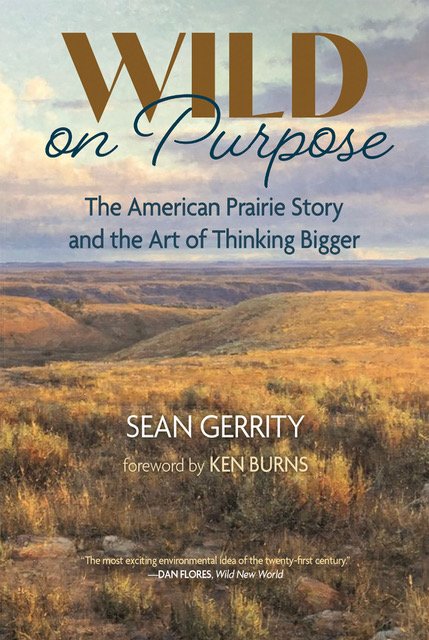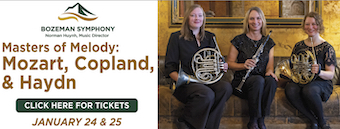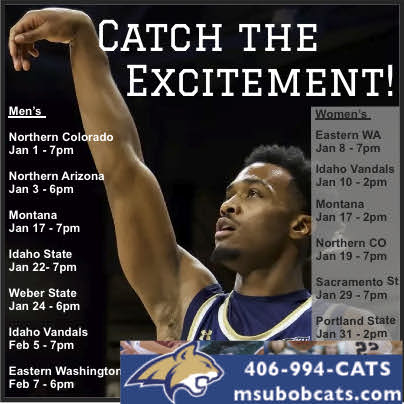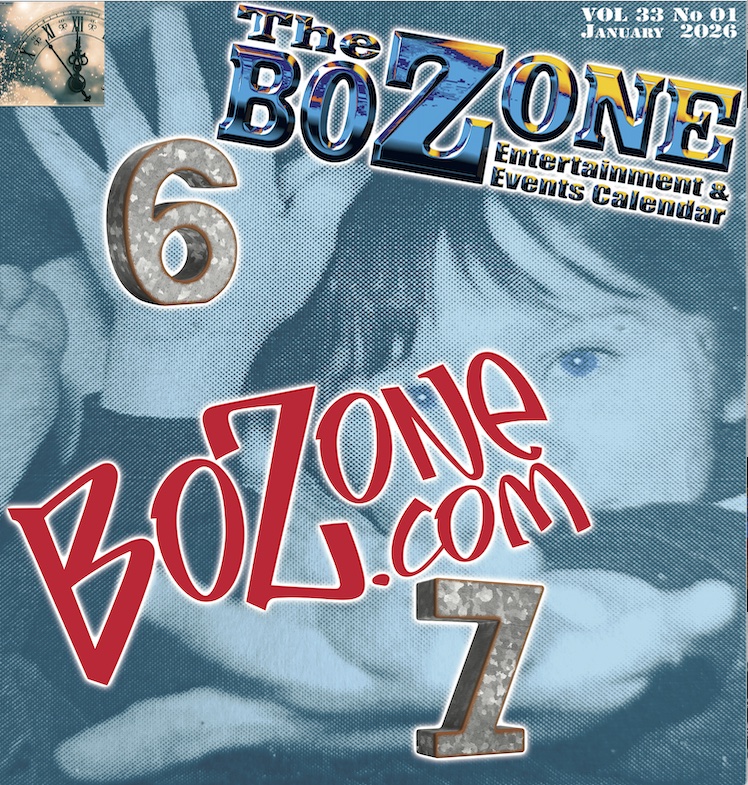Spend the holiday season with Annie & Co. at The Ellen
Opening December 1st, Annie, this year’s Ellen Theatre holiday spectacular, will transport audiences to 1930s New York for the classic story of everyone’s favorite red-headed orphan and her trusty pooch. Long on inspirational optimism just in time for the season of giving, this singing and dancing extravaganza features musical hits “It’s a Hard Knock Life,” “Maybe,” “Easy Street,” “I Don’t Need Anything But You,” and of course, “Tomorrow.” Gather family and a couple friends, then head downtown for the heartwarming tale that has delighted audiences worldwide.
Prior to Annie’s upcoming baker’s dozen of performances, the Rolling Zone sat down with Ellen Executive Director, John Ludin, to talk community theatre and bringing this family favorite to life.
RZ: Montana TheatreWorks’ production of Annie will soon be unveiled to the public. How are rehearsals and preparation going?
JL: So far, so good. It’s always an adventure, for sure. I think there’s probably fifteen in the cast that haven’t done a show with us before, and we like to get as many new people involved as possible. The process is new for them, but there’s always a level of excitement they bring that’s fun too. But yes, all is on schedule so far.
RZ: Why was this particular tale selected for the holiday production this year?
JL: I love this show. It’s a real family show, it takes place at Christmastime [with] a big holiday finish to it, and it’s very uplifting as well. The message is about hope and joy — “The sun’ll come out / Tomorrow.” And that’s a good message for us right now. I think during the holidays, it’s perfect.
RZ: Annie is a children’s favorite, but most certainly meant to be enjoyed by every generation. Do you think the nostalgia attached to this story will draw in mature audiences?
JL: It takes place in the 30s, FDR is a character in the play, and there are a lot of references for the older audiences. There’s a song that mentions the Gershwins, Kaufman and Hart, writers from back then [who are] getting more and more obscure. To me, because the message is so universal and important, it touches everybody in a very nice way. It’s about being needed and wanted as well. In the first song, Annie sings about maybe finding her parents. It’s not a razzle dazzle, knock ‘em out opening. It’s extremely touching, a very sweet sentiment about these kids who don’t have parents and are hoping for a better life [outside] this lousy orphanage in which they live.
RZ: I might be mistaken, but I think a lot of people forget the 1982 film was in fact based on a Broadway musical. For those who may have only seen the movie or its recent remake, why is this live staging a better way to experience this story?
JL: It’s always different to see something live. It started out as a comic strip, and had a great basis in that there was so much from which to draw. It was an extremely popular comic strip back in the day with all the characters, [including] Daddy Warbucks. Movies are great, but you can do thirty takes to get a number correct. In this situation, you get one shot — the whole orchestra is playing live, everybody’s singing live, dancing live — and it’s going to go how it goes. Hopefully it’ll be exactly right, and you rehearse for three months to make sure that it does, but you never know. And this show has a dog! We’ve had rehearsals where it’s gone great, and we’ve had rehearsals where it’s like, “Whoops!” If that happens, what are we going to do. That’s the fun element of theatre, and that the audience is part of the show. Their reactions help move things along. You feed off the audience, and the audience helps energize the cast. It’s really a give and take. That’s what makes it different than a movie.
RZ: It’s not all about the hit songs sung by the orphans. Also on display are the production values. Tell us a little about what goes into a show like this before curtains up.
JL: We’re very lucky to have an extremely talented team. Mary Jo Ludin directs, and our daughter, Malia Ludin, is doing the choreography. Joel Jahnke is our lighting designer, and it’s going to be just beautiful in that regard. Tom Watson is our set designer. I think I mentioned this show to Tom in maybe April, so he had time to think about how he wanted to tackle making Daddy Warbuck’s mansion, how the orphanage is going to be portrayed. Everything has to fit, it has to work together. When we’re at the mansion, all of the stuff from the orphanage has to go someplace and we have very limited room backstage. It’s a jigsaw puzzle. That’s kind of a fun part of the process, figuring out how we’re going to make it all work. There are definitely key players putting the whole thing together. That includes choreographer, music director, costume designer — they’re all just as important as the director in making sure these shows come off well.
RZ: And what about this venue? How does having the historic Ellen host this production add to its presentation?
JL: What I love when we do a show like this, the proscenium and the theater itself becomes a part of the show. It’s almost like it’s this beautiful framework for what’s happening. It just makes it that much more enjoyable. And the acoustics are so great in the theater. It’s a very warm, intimate feeling to sit in the theater, even though there’s four hundred other people sitting around you. It feels kind of like you’re in your living room enjoying a performance. It’s not cavernous. Some of these big theaters have two, three thousand seats. Yeah, the production values are big and splashy, but at the same time, you lose a little bit of the intimacy of a smaller theater. I really like that we’re [in] one of those venues that’s a little more intimate.
RZ: Those who previously enjoyed Oliver!, Fiddler on the Roof, and White Christmas may have an idea of what your productions look like. For those who didn’t have a chance to catch one of these, how does TheatreWorks like to present these classics?
JL: We just really strive to do it as best we can. One of my favorite things is when [I’m asked] where these people are from, if this is a touring show. No. This is all homegrown. Everybody in the cast and all the musicians are local. Everything you see is made here, done here. It’s just a matter of spending enough time and energy, and you can make it as professional of a show as possible. Auditions were close to four months ago, and these people give a lot of their time. They all have their regular lives, too. The kids are going to school and the adults have day jobs. We get together in the evenings and rehearse, as well as long Saturdays. People tend to enjoy the fact this is their community. That’s something that seems to surprise people. We love that we can share that with everybody.
RZ: Launched in 1995 with Damn Yankees, this troupe now puts out at least two big shows a year. How might you reflect on TheatreWorks’ success some twenty-three years and counting?
JL: There’s always a big summer show. [After Damn Yankees,] I think we did Charlie Brown right after the first of the year, then Guys and Dolls that summer, and Annie in ’96. We’d done a show and people wondered what we were going to do next. We didn’t really start [TheatreWorks] with the idea it was going to be this long running thing. It was really more of a “let’s see if we can do a show.” It was successful and people really responded. Never in my wildest dreams, if you had asked me in 1995, that we were doing Annie at The Ellen in 2017 and that the theatre company was able to purchase the building — that’s astounding to me. It’s been a great ride so far.
RZ: Does the audition process bring out a lot of hopefuls?
JL: We see a lot of people. [With Annie], it was particularly fun to see so many little girls. I think eighty-five tried out for the ten spots. It’s hard, you know, you break a lot of hearts. The nice thing is you’re able to get kids that are really amazingly talented. They know they’re in for a lot of work and that translates to a lot of fun once you’re prepared, you’re on stage, and the curtain goes up for the first time. They’re at a place now that sort of reminds me of the racehorse in the gate waiting for the starting bell. You can see the excitement, and every rehearsal is getting better and better. It’s fun to see that evolution.
RZ: Tell us a little about TATE Academy, which also utilizes The Ellen stage.
JL: TATE is an afterschool and summer program that simply stands for “Theatre at The Ellen.” We work with kids, and there’s some adult classes as well. There are kids that have that interest, and sometimes they fall through the cracks. They’re not athletes maybe, or they don’t play a musical instrument. There are lots of opportunities for that in town, but fewer in the performing arts. TATE is about the discipline of those skills. The thing about theatre is that it’s so much fun, [and] looks like so much fun when you’re watching a show or a musical. At the heart of it, there’s a lot of work and discipline that goes in [before] getting to that place where it looks easy and fun. It’s no different than doing your piano scales every day, or batting practice. Whatever you do, you practice, practice, practice to the point you’re comfortable with being able to perform. Theatre is no different.
RZ: TheatreWorks recruits aspiring thespians of all ages. How does one become involved with the eventual goal of joining, say, the cast of next year’s holiday production?
JL: Auditions are always open to everybody. We post them on our website and in the newspaper. If you’re interested, show up. Even if you don’t make it the first time you try, at least you’ll see what the process is. We’re extremely welcoming. Like I said, we try to get as many new people as possible. Our goal is to make the audition process comfortable and easy, because it’s kind of scary anyway. If we can make you as comfortable and as great as you can be, that makes our job easier. We’re not looking to pull the handle and open a trap door and send you away. [laughs] We want you to be great.
RZ: Annie is obviously the current focus, but what does Montana TheatreWorks have in the pipeline for 2018?
JL: We’re doing a new play in February and we’re doing a musical in the summer, but I couldn’t tell you what it is yet. We’ll probably decide on that come January. The nice thing about the theater is that it’s a community space, allowing us to be supported by many things — the schools use it a lot, MSU has many functions, we’ve a lot of concerts, free family movies, PechaKucha, and we love having Bozeman Film Society here. It’s home to many things. It’s nice we don’t have to worry about trying to do a show every month or two. Then when we do [put on] a show, we can focus and put a lot into each. I would rather do two or three shows really well, as opposed to six or seven “okay” shows over the course of a year.
RZ: Well, we are certainly excited about The Ellen’s staging of Annie.
JL: I’m looking forward to the show. It’s so much fun working with little kids. They’ve really risen to the occasion [and are] doing a bang-up job. I’m really proud of them. It’s such a delightful journey to see where they are at the very first rehearsal when nobody really knows what’s going to happen. They learn the music, they learn the choreography, they learn their blocking. Slowly but surely, we add set pieces, the orchestra, costumes, and microphones. You can see them stepping up to the challenge. And all of a sudden, it’s a show. We’re just waiting for the final piece — the audience.
Thirteen Annie performances will take place between December 1st and 22nd. Evening shows are set for Dec. 1st and 2nd, 8th and 9th, 14th, 15th, 16th, 20th, 21st, and 22nd at 7:30pm. Matinees are Dec. 3rd, 10th, and 17th at 3pm. Tickets are $24.50 for adults and $18.50 for youth 17 and under. Premium seating is also available for $33.50, as well as upper balcony for $18.50. A $2.50 transaction fee will be added to the entire order.
Wine, beer, and other refreshments will be sold in the lobby beginning one hour prior to all Ellen showtimes. For questions about these events, ticketing information, or other inquiries, visit www.theellentheatr







